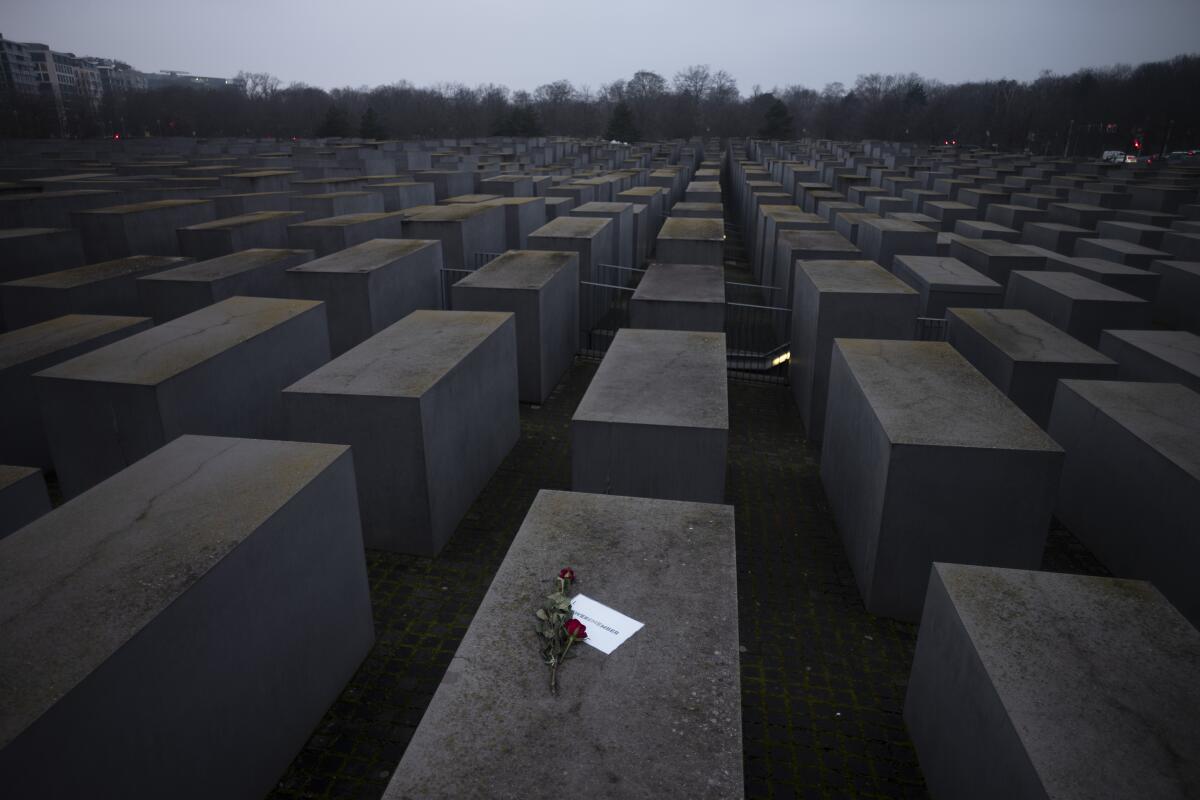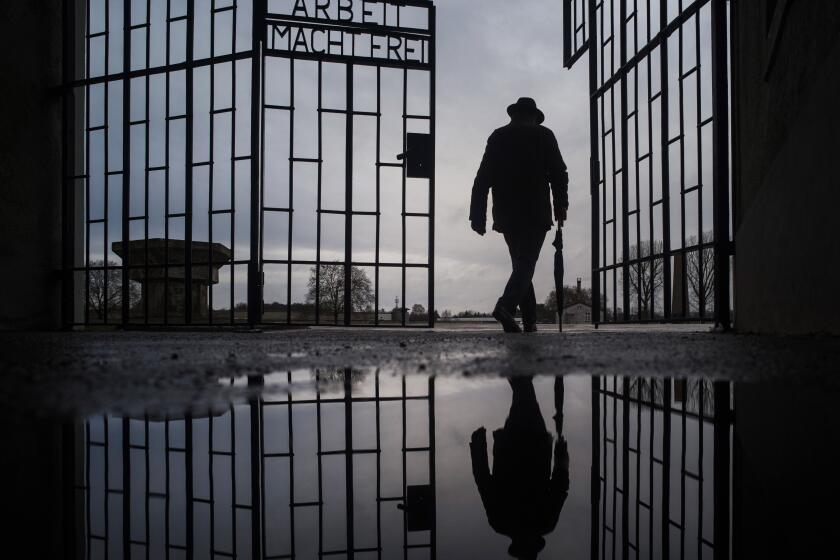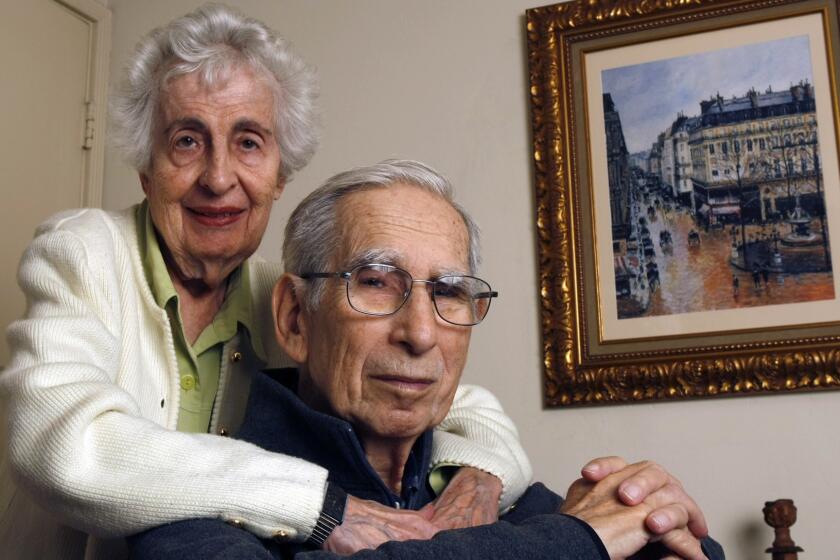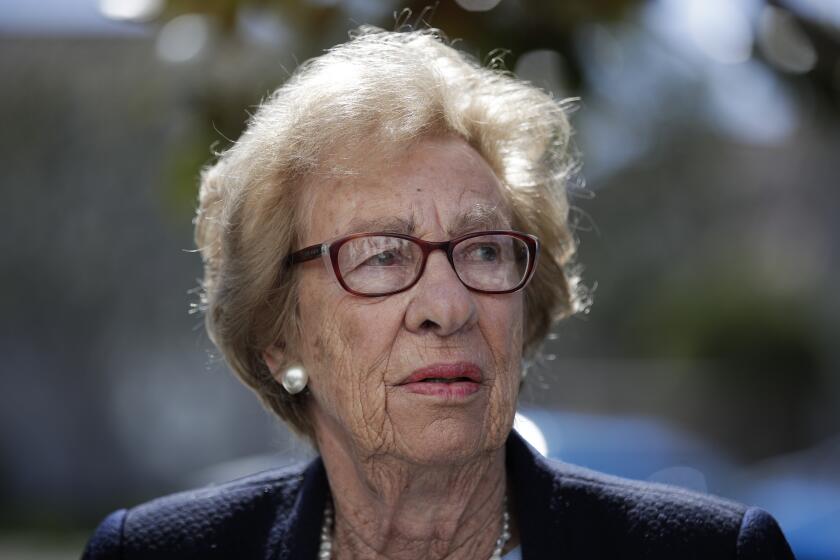Auschwitz survivors mark Holocaust Remembrance Day online amid pandemic

- Share via
WARSAW — A Jewish prayer for the souls of people murdered in the Holocaust echoed Wednesday over the site where the Warsaw Ghetto stood during World War II as a world gripped by the COVID-19 pandemic observed the 76th anniversary of the liberation of Auschwitz.
Most International Holocaust Remembrance Day commemorations were being held online this year because of the coronavirus, including the annual ceremony at the site of the former Auschwitz death camp, where Nazi forces killed 1.1 million people in occupied Poland. The memorial site is closed to visitors because of the pandemic.
In one of the few live events, mourners gathered in Poland’s capital to pay their respects at a memorial in the former Warsaw Ghetto, the largest of all the ghettos where European Jews were held in cruel and deadly conditions before being sent to die in extermination camps.
From the Vatican, Pope Francis spoke of the need to remember the genocide carried out in World War II, saying remembrance was a sign of humanity and a condition for a peaceful future.
Francis also warned that distorted ideologies could lead to a repeat of mass murder on a horrific scale. Remembering the Holocaust, he said, “also means to be aware that these things can happen again, starting with ideological proposals that claim to save a people and end up destroying a people and humanity.”
Among those commemorating at home Wednesday was Polish-born Auschwitz survivor Tova Friedman, who arrived at the camp when she was 5 years old and was 6 when she found herself among thousands of survivors liberated by Soviet troops Jan. 27, 1945.
Hundreds of Holocaust survivors in Austria and Slovakia are to get their first COVID-19 shots on the 76th anniversary of the liberation of Auschwitz.
Friedman, now 82, attended last year’s event at Auschwitz and had hoped to take her eight grandchildren there this year to help them better understand her experiences. But the pandemic prevented that.
From her home in Highland Park, N.J., she recorded a message warning about the rise of hatred. The message will be included in a virtual observance organized by the World Jewish Congress.
Across Europe, the victims were remembered and honored in various ways.
In Austria and Slovakia, hundreds of Holocaust survivors were offered their first doses of the COVID-19 vaccine.
An 88-year-old Holocaust survivor became the first, and so far only, Israeli to die of COVID-19.
Israel, which counts 197,000 survivors of the genocide, officially marks its remembrance day in the spring. But events were also being held by commemoration and survivors’ groups across the country, mostly virtually or without members of the public in attendance.
Luxembourg signed a deal Wednesday agreeing to pay reparations and to restore dormant bank accounts, insurance policies and looted art to Holocaust survivors.
Politicians and everyday folk are joining a World Jewish Congress campaign that involves people posting photos of themselves and the hashtag #WeRemember. Those will be shown later Wednesday on a screen at Auschwitz next to the camp’s gate and a cattle car. The Nazis used such cars to transport people to the camp.
The online nature of this year’s commemorations is a sharp contrast to events marking the 75th anniversary of Auschwitz’s liberation last year, when some 200 survivors and dozens of European leaders and royalty gathered at the site of the former camp. It was one of the last large international gatherings before the pandemic forced the cancellation of most large gatherings.
Holocaust remembrances have been upended this year by a new enemy: COVID-19.
More than 1.1 million people were murdered by the German Nazis and their henchmen at Auschwitz, the most notorious in a network of killing sites set up across occupied Europe. The vast majority of those killed at Auschwitz were Jews, but others, including Poles, Roma, gay people and Soviet prisoners of war, were also murdered.
In all, about 6 million European Jews and millions of other people were killed by the Nazis and their collaborators. In 2005, the United Nations designated Jan. 27 as International Holocaust Remembrance Day.
Although commemorations have moved online for the first time, one constant is the drive of survivors to tell their stories as words of caution.
Rose Schindler, a 91-year-old Auschwitz survivor originally from Czechoslovakia but now a resident of San Diego, has been speaking to school groups about her experience for 50 years. Her story, and that of her late husband, Max, also a survivor, is also told in the book “Two Who Survived: Keeping Hope Alive While Surviving the Holocaust.”
The back-and-forth legal drama over an Impressionist masterpiece that hangs in a Spanish museum has seemingly come to the end of the road for a San Diego family, which is left with nothing to show for their decade-long battle to reclaim the artwork they say was seized from them by Nazis 80 years ago.
After Schindler was transported to Auschwitz in 1944, she was selected more than once for immediate death in the gas chambers. She survived by escaping each time and joining work details.
The horrors she experienced — the mass murder of her parents and four of her seven siblings, the hunger, being shaven, lice infestations — are difficult to convey, but she keeps speaking to groups, using Zoom during the last several months.
“We have to tell our stories so it doesn’t happen again,” Schindler said in a Zoom call from her home this week. “It is unbelievable what we went through, and the whole world was silent as this was going on.”
Friedman says she believes it is her role to “sound the alarm” about rising anti-Semitism and other hatred in the world; otherwise, “another tragedy may happen.”
Holocaust survivors worldwide are demanding that Facebook CEO Mark Zuckerberg take action to remove material denying the Nazis’ genocidal campaign.
That hatred, she said, was on clear view when a mob inspired by President Trump attacked the U.S. Capitol on Jan. 6. Some insurrectionists wore clothes with anti-Semitic messages such as “Camp Auschwitz.”
“It was utterly shocking, and I couldn’t believe it,” Friedman said Monday. “And I don’t know what part of America feels like that. I hope it’s a very small and isolated group and not a pervasive feeling.”
In her recorded message that will be broadcast Wednesday, Friedman said she compared the virus of hatred in the world to the coronavirus. She said the world today was witnessing “a virus of anti-Semitism, of racism, and if you don’t stop the virus, it’s going to kill humanity.”
More to Read
Sign up for Essential California
The most important California stories and recommendations in your inbox every morning.
You may occasionally receive promotional content from the Los Angeles Times.
















